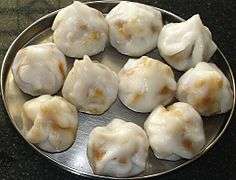Kozhukkatta
|
Kozhukatta/kozhukkattai | |
| Course | Dessert |
|---|---|
| Place of origin | India |
| Region or state | Kerala and Tamil Nadu |
| Main ingredients | Grated coconut, jaggery |
|
| |
Kozhukatta (Malayalam: കൊഴുക്കട്ട) or Kozhukkattai (Tamil: கொழுக்கட்டை) is a popular South Indian sweet dumpling made from rice flour, with a filling of grated coconut and jaggery. It is similar to modak made in other parts of India. Kozhukatta is usually eaten as breakfast or as a snack with tea.
In Tamil Nadu the dish is traditionally associated with the Hindu God Ganesha and prepared as an offering on the occasion of Vinayaka Chathurthi. In Kerala it is popularly associated with Oshana Sunday evening celebrations of Saint Thomas Christians.[1]
Preparation
The dish is prepared by mixing grated coconut with jaggery, placing it inside dumplings of rice flour, and steaming them. Ghee, cardamom, and finely ground roasted rice flour, etc. can be used to add taste to the filling.
Variants
Thennai Kozhakkattai is a sweet dish popular in South Tamil Nadu and Kerala. It is typically prepared on special occasions and involves significant work, usually involving the entire family.
Thennai kozhakattai is made of the same ingredients as kozhakattai, but it is prepared by filling young palm leaves.
Manda pitha is a sweet dish similar to kozhakattai found in the eastern state of Orissa. Another variant exists in the state of Kerala as a staple breakfast among the poorer masses; it is made of Atta flour and grated coconut.
Customs
Kozhukkattai form the basis of a number of natal customs among the Sri Lankan Tamil community. There is a custom in the north involving dumplings with edges pressed to resemble teeth being dropped gently on a baby's head while the family wishes for the infant to develop healthy teeth.[2] In eastern areas, such as Amparai district, piḷḷai kozhukkaṭṭai, a smaller version, are prepared for an expectant mother at about four months after conception by female family members. They are commonly exchanged sweets at weddings as auspicious symbols of "plump" health and fertility.[3]
See also
| Wikibooks Cookbook has a recipe/module on |
References
- ↑ http://indiankeralafood.blogspot.in/2011/04/kozhukatta.html
- ↑ Sri Lanka. Ediz. Inglese. 2006. p. 71.
- ↑ McCormack, Carol (1994). Ethnography of Fertility and Birth. Waveland Press. p. 46.
External links
| Wikimedia Commons has media related to Kozhukkatta. |



